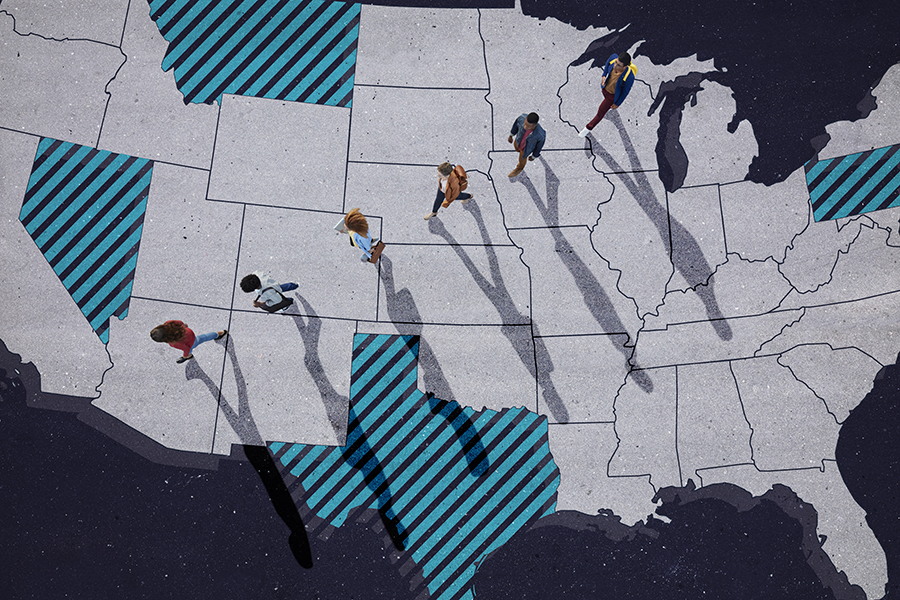Denial, anger, bargaining, and depression have all been in the mix of emotions experienced in the last two years. Still, after each of these, it has inevitably come to the final stage of acceptance for many.
For Google, that moment seemingly came in May 2021 when, after its latest plan to open offices was disrupted yet again by spiraling COVID-19 cases, it threw its proverbial hands in the air and accepted that there was no way of knowing if or when normal business would resume.
The remote and hybrid work genie is officially out of the bottle and settling in for the long stay. It will inevitably impact how leaders view the years to come and what attitudes, skills, and adaptations to their practices will be needed to best navigate and excel in the new world of work.
The second major reckoning coming to leaders is the need to filter major and minor decisions through the lens of their resulting social and environmental impact. With a recent PWC report finding that 83% of consumers think companies should be actively shaping ESG (Environmental, Social & Governance) best practices rather than reacting and adjusting, not only is there an urgent moral argument for leaders to get their houses in order quickly, but a compelling business case. So how will these dynamic forces that are instigating once-in-a-generation change impact leaders in 2022?
1. Virtual Workplaces will get smarter … way smarter.
Many leaders think that they’ve recreated their physical workplace into a virtual one with a corporate Zoom package and a Slack subscription. The reality is, it isn’t that easy. Leaders will need to be smart as they set about building a digital equivalence to something physical that took decades to refine. They’ll also need help. Most leaders wouldn’t contemplate asking Bill in HR or Jenny in IT to come up with designing a new office, but for many, that’s exactly who is being tasked with curating their virtual workplace. I expect to see an entirely new category of specialists emerge, people who create advanced digital workplaces. These next-generation, virtual work environments won’t necessarily be curated with all new technologies (let’s be honest, there’s a lot of those already) but could skilfully combine existing platforms with evolved processes and leadership practices. The goal? To build trusting, collaborative teams that can drive together productivity and innovation — from bedrooms to boardrooms.
2. Impact leaders will be challenged to have impact.
Speaking in May 2021 at a New York conference hosted by the Wall Street Journal, JPMorgan CEO Jamie Dimon (pictured above) aired his view on why JP employees should all return to the workplace. In his view, by the following September or October, “It will look just like it did before, and everyone’s going to be happy with it.”
The inescapable truth is that, while a return to the office for Dimon and other JPMorgan employees would be a welcome resumption, for others, it would undoubtedly represent a significant step backward. Corporate leaders tend to come from privileged groups, making it harder to appreciate the realities of in-person work environments for those who experience many physical or social impediments. For many, a virtual environment levels the playing field.
Working in a non-physical workplace allows people not to be judged physically. Recognizing that a one-size workplace doesn’t fit all is step one. Decisively acting on it to create new and dynamic structures that work for diverse teams is step two and what impactful leaders will be increasingly challenged to do.
3. More corporations will get in the ring.
In September 2021, Salesforce, a company with a global workforce of more than 56,000 people, led by CEO Marc Benioff (pictured above), offered to relocate Texas-based employees and their families after a Texas abortion law went into effect. While not directly commenting on the law itself, Salesforce took a vocal, public stand by recognizing and respecting deeply held and different world views. “If you have concerns about access to reproductive healthcare in your state, Salesforce will help relocate you and members of your immediate family,” they told employees.
Throwing substantial corporate weight into the ring to back consequential causes or counter perceived injustices will, in my opinion, continue to be a growing trend with the lead taken by brands such as Salesforce but also brands such as Ben & Jerry’s, Patagonia, Lyft, Levis, and others. They will set a standard for others to follow.




































